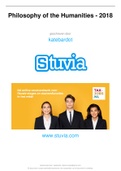Philosophy of the Humanities - 2018
geschreven door
katebardot
www.stuvia.com
Gedownload door: katebardot | dijkmanclaire@gmail.com
Dit document is auteursrechtelijk beschermd, het verspreiden van dit document is strafbaar.
, Stuvia - Koop en Verkoop de Beste Samenvattingen
Philosophy of the Humanities (Media Studies) – 2018
Table of Content
Chapter 1: The Scientific Revolution.......................................................................................................1
Chapter 2: Revolution in science in early 20th century:.........................................................................7
Chapter 3: Revolution in the Humanities..............................................................................................11
Chapter 4: Humanities in the 19th century..........................................................................................17
Chapter 5: Positivism and Structuralism...............................................................................................25
Chapter 6: Critique of Modernity.........................................................................................................31
Chapter 1: The Scientific Revolution
What does philosophy involve?
- Reflection (on basically anything – ethics, knowledge, science, etc.)
1
Gedownload door: katebardot | dijkmanclaire@gmail.com
Dit document is auteursrechtelijk beschermd, het verspreiden van dit document is strafbaar.
, Stuvia - Koop en Verkoop de Beste Samenvattingen
- Analyse concepts (meaning, assumptions, implications)
- Philosophy is reflection mainly through conceptual analysis
Basic themes in the philosophy of science:
Basic assumptions (ontology)
o exams the basic things that exist in reality
Methods (epistemology)
o Exams how knowledge is justified
o The ways of knowing things
Practices
o Exams how science is practiced by scientist
History of science
Social function and relevance of science
Philosophy is a normative field: find norms for science based on the analysis
Philosophers tried to formulate norms for what good scientific methods are or rejects certain ideas
ontology. So, philosophy of science is a normative field, they find norms for science on the basis of
the analysis of key concepts.
Philosophy is a descriptive field: take in account what scientist are doing
You have to take in account what scientist are actually doing. That’s a deceptive dimension of the
philosophy of science. You must take in account as practices or historical developments.
Standard image of science emerged in the Scientific Revolution:
Contrast with Aristotelian science and new science that emerges in the 17 th century
o Scientific revolution is a rejection of the Aristotelian perspective
Transformation of science
Philosophical reflection
Recurring theme: nature of knowledge, how can we justify knowledge
Especially: knowledge of the universal or general aspects of the world outside us (cf. Plato)
Modern scientist wants to discover the laws of nature not what happens in individual cases
but in universal or general aspects of nature. The nature of knowledge and especially the
universal aspect.
Plato claims that our observation of the world around us might be spurious. Real knowledge is of the
world outside transcending this visible world, only then universal knowledge is possible. The problem
for Plato is how to say that all these individual horses belong to that one class of horse. Outside this
world there must be a perfect horse. That knowledge can only be acquired by special people, namely
philosophers. Plato says that only special people as philosophers can acquire real knowledge, but
modern scientist say only methods can acquire real knowledge.
1. The Scientific Revolution: Contrast with Aristotelian science
Aristotle (384-322 BC)
Three forms of knowledge:
Theoretical knowledge
2
Gedownload door: katebardot | dijkmanclaire@gmail.com
Dit document is auteursrechtelijk beschermd, het verspreiden van dit document is strafbaar.
, Stuvia - Koop en Verkoop de Beste Samenvattingen
o pure knowledge of the unchanging thing in the world
o mathematics, nature, physics, god theology, the basic structure of reality, ontology
Practical knowledge
o you need to make the right choices in social or political context
o changeable, things happen in the social world
o ethics, political science, rhetoric
Poetical knowledge
o you need to make something
o carpenter to make a table, painter needs to make a painting
- Difference than how we nowadays approach knowledge:
- Humanities positions in all three, literal for example could be placed in poetical knowledge, ethics
belongs to practical and metaphysics to theoretical.
- Scientist belongs to theoretical knowledge
Knowledge according to Aristotle: deductive system:
- for our knowledge to be universal it must be structured in a deductive system
Deduction: the inference of statements of more general statements
- deductive of knowledge is a kind of pyramid with the most general statements at the top of the
pyramid and then you can infer everything from these general statements.
Syllogism: deduction has according to Aristotle a specific form
- all men are mortal > Socrates is a man > therefore: Socrates is mortal
Knowledge is a pyramid and at the top of that pyramid there a first principle:
all movement is movement towards a natural point of rest
- if drop paper it falls to the floor, because it moves to natural point of rest
- things has an inherent aim to move to the natural point of rest
- explaining this way then we have universal knowledge of the world
Knowledge involves why something happens
- why do these papers fall to the floor
- causality
Four causes of causality
1. Material cause
a. the matter of something is made
b. table is made of wood
2. Formal cause
a. form something has
b. table has four legs and flat top
c. all things are a combination of matter and form
3. Final cause
a. aim or function something has
b. chair is to sit on
4. Efficient cause
a. thing or person who make something into what it is
b. carpenter is the cause of the table he is the cause of the table he makes the table
3
Gedownload door: katebardot | dijkmanclaire@gmail.com
Dit document is auteursrechtelijk beschermd, het verspreiden van dit document is strafbaar.





